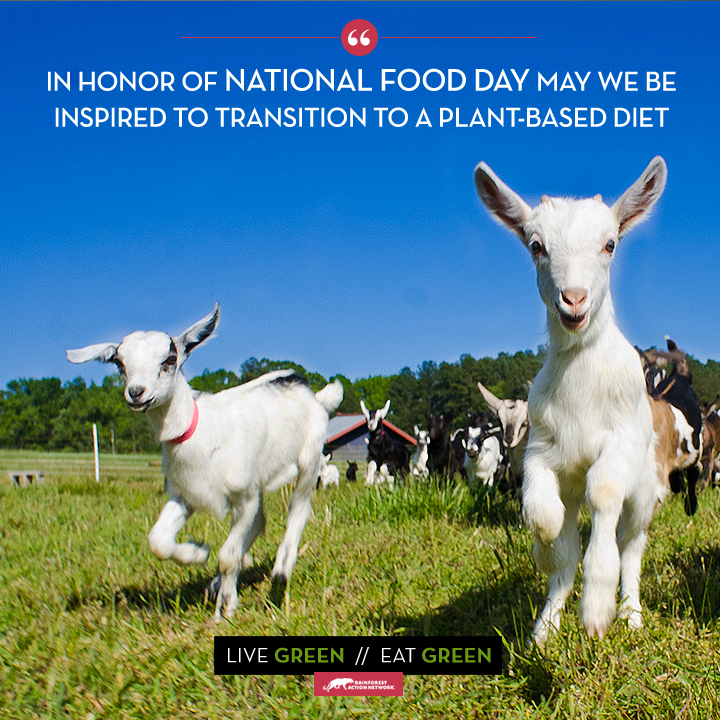 This week over five thousand colorful events are taking place in communities across the country to celebrate National Food Day, a project of Center for Science and the Public Interest (CSPI). National Food Day mobilizes people at every step of the food system and aims to promote healthier diets, support local and organic farms, reduce hunger and improve access to food, end factory farming to protect animal rights and the environment and support fair working conditions for farm workers.
This week over five thousand colorful events are taking place in communities across the country to celebrate National Food Day, a project of Center for Science and the Public Interest (CSPI). National Food Day mobilizes people at every step of the food system and aims to promote healthier diets, support local and organic farms, reduce hunger and improve access to food, end factory farming to protect animal rights and the environment and support fair working conditions for farm workers.
Given the current state of our food system and it’s reliance on large scale industrial agriculture, there is a lot of work to be done in each of these realms. In honor of Food Day I want to highlight some examples of the inspiring work our allies are doing in the world to break America’s addiction to packaged, processed, refined foods that almost all contain Conflict Palm Oil – an ingredient that symbolizes our broken food system.
Just last week on World Food Day National Geographic launched an eight month series dedicated to investigating the challenges and solutions to feeding everyone on our planet. It’s short launch video packs a punch, driving home the point that even though the world’s population will likely increase 35 percent by 2050, the solution is not necessarily growing more food! Instead National Geographic recommends a powerful 5 point plan:
1) We need to stop cutting down forests for agribusiness (according to the Climate Land Use Alliance, commercial agriculture drives 71% of tropical rainforest destruction!)
2) We should grow more on the farmland that already exists
3) We must use resources more efficiently (i.e. approximately 80% of our developed water supply goes towards agriculture, the majority of which goes to alfalfa which we feed to dairy cows and beef cattle!)
4) Transition to plant-based diets since meat-intensive diets are not only bad for the environment but feed the demand for cruel industrial animal production
5) Reduce waste (an estimated 25% of food in America is currently wasted according to National Geographic)
Amen.
Transitioning our families to a plant-based diet is a win-win. It means feeding our kids real food (think organic fruits and veggies and whole grains) that doesn’t come out of a bag or a box, which is exponentially more healthy for our bodies and the planet. It means decreasing the likelihood that our kids are consuming Conflict Palm Oil and unwittingly pushing orangutans to the brink of extinction. And finally, a plant-based diet translates into consumption of fewer animal products which have a huge climate footprint and drive gross human and animal rights abuses.
It’s reassuring to explore the landscape of solutions-oriented work happening in the world today – I am so inspired by the excellent work of people like the Food Babe, Andrew Wilder and Melissa Lanz, who are all using creative approaches to promote eating real food. I met Vani Hari, aka the Food Babe, at ShiftCon earlier this month. She is a gutsy, relentless food activist hot on the trail to investigate what’s really in our food, and pressures companies to remove toxic ingredients threatening public health. And she wins victory after victory! Melissa is a mother of two who inspires millions of Americans to stop relying on microwave dinners and packaged foods for convenience. She works to redefine the dinner table by encouraging people to stick with twenty fresh, seasonal ingredients each week. Andrew hosts October Unprocessed, challenging people to pledge to go the entire month of October without consuming any processed foods. His brilliant cooking oil comparison chart fittingly places palm oil at the bottom of the rung for it’s devastating environmental impacts.
As Michael Pollan sagely writes in Food Rules:
“After spending several years trying to answer the supposedly incredibly complicated question of how we should eat in order to be maximally healthy, I discovered the answer was shockingly simple: eat real food, not too much of it, and more plants than meat. Or, put another way, get off the modern western diet, with its abundance of processed food, refined grains and sugars, and its sore lack of vegetables, whole grains and fruit.”
In honor of National Food Day may we be inspired to transition to a plant-based diet consisting of mostly whole foods – fruits, veggies, grains, and legumes, i.e. real food. By moving away from the packaged, processed products in the middle aisles of the grocery store (that are chalk full of Conflict Palm Oil) and meat we can support a diet that is healthy for our bodies and the planet.
On National Food Day we should also consider how our diets in the U.S. impact people around the world. Close to ninety percent of the world’s palm oil is cultivated in Indonesia and Malaysia where communities are losing access to their land and livelihoods. The global demand for cheap commodities like palm oil is driving multinational corporations to wipe out local food sovereignty and food security. Do your part by considering the benefits of a compassionate, plant-based diet and supporting your local farmers markets!